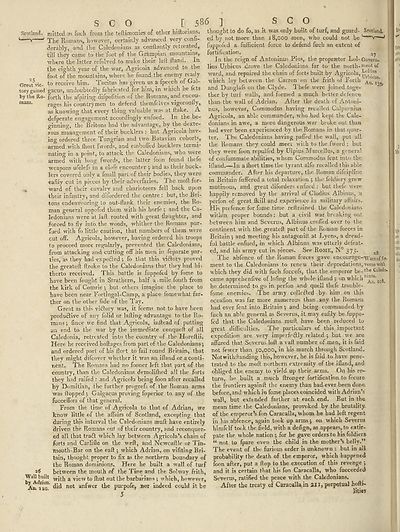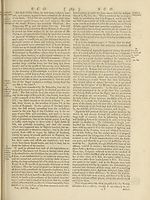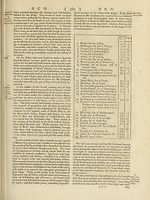Encyclopaedia Britannica, or, a Dictionary of arts, sciences, and miscellaneous literature : enlarged and improved. Illustrated with nearly six hundred engravings > Volume 18, RHI-SCR
(624) Page 586
Download files
Complete book:
Individual page:
Thumbnail gallery: Grid view | List view

Scotland.
25
Great vie
SCO E
mltted as fucb from the teftimonies of other hiltorians.
The Romans, however, certainly advanced very confi-
derahly, and the Caledonians as conflantly retreated,
till they came to the foot of the Grampian mountains,
where the latter refolved to make their latt ftand. In
the eighth year of the war, Agricola advanced to the
foot of the mountains, where he found the enemy ready
uiem vu.- 1° receive him. Tacitus has given us a fpetch of Gal-
tory gained gacus, undoubtedly fabricated for him, in which he fets
by the Ro- forth the afpiring difpofition of the Romans, and encou-
aians' rages his countrymen to defend themfelves vigoroufly,
as knowing that every thing valuable was at flake. A
defperate engagement accordingly enfued. In the be¬
ginning, the Britons had the advantage, by the dexte¬
rous management of their bucklers : but Agricola hav¬
ing ordered three Tungrian and two Batavian cohorts,
armed with fhort fwords, and embofied bucklers termi¬
nating in a point, to attack the Caledonians, who were
armed with long fwords, the latter foon found thefe
weapons ufelefs in a clefe encounter *, and as their buck¬
lers covered only a fmall part of their bodies, they were
eafily cut in pieces by their adverfaries. The mofl for-
^ ward of their cavalry and charioteers fell back upon
their infantry, and difordered the centre : but, the Bri¬
tons endeavouring to out-flank their enemies, the Ro¬
man general oppofed them with his horfe ■, and the Ca¬
ledonians were at lail routed with great flaughter, and
forced to fly into the woods, whither the Romans pur-
fued with fo little caution, that numbers of them were
cut off. Agricola, however, having ordered his troops
fo proceed more regularly, prevented the Caledonians,
from attacking and cutting off his men in feparate par¬
ties, as they had expedied; fo that this viftorv proved
the greateft ftroke to the Caledonians that they had hi¬
therto received. This battle is fuppofed by fome to
have been fought in Strathern, half a mile fouth from
the kirk of Comrie •, but others imagine the place to
have been near Fortingal-Camp, a place fomewhat far¬
ther on the other fide of the Tay.
Great as this vidlory was, it feems not to have been
produdlive of any folid or lafting advantage to the Ro¬
mans ; fince we find that Agricola, inftead of putting
an end to the war by the immediate conqueft of all
Caledonia, retreated into the country of the Horeftii.
Here he received hoftages from part of the Caledonians*,
and ordered part of his fleet to fail round Britain, that
they might difeover whether it was an ifland or a conti¬
nent. The Romans had no fooner left that part of the
country, than the Caledonians demoliihed all the forts
they had raifed r and -Agricola being foon after recalled
by Domitian, the further progrefs of the Roman arms
was flopped 3 Galgacus proving fuperior to any of the
fucceffors of that general.
From the time of Agricola to that of Adrian, we
know little of the affairs of Scotland, excepting that
during this interval the Caledonians muff have entirely
driven the Romans out of their country, and reconquer¬
ed all that tra<!il which lay between Agricola’s chain of
forts and Carlifle on the weft, and Neweaftle or Tin-
mouth-Bar on the eaft 3 which Adrian, on vifiting Bri¬
tain, thought proper to fix as the northern boundary of
the Roman dominions. Here he built a wall of turf
between the mouth of the Tine and the Solway frith,
with a view to fhut out the barbarians ; which, however,
did not anfwer the purpofe, nor indeed could it be
5
Scotland.
27
3$
Wall built
by Adrian.
An. 120.
586 ] SCO
thought to do fo, as it was only built of turf, and guard¬
ed by not more than i8,ooq men, who could not be '
fuppofed a fufficient force to defend fueh an extent of
fortification.
In the reign of Antoninus Pius, the propraetor Lol-Govern.
lius Urbicus drove the Caledonians far to the north-ment of
■ward, and repaired the chain of forts built by Agricola, j^!us
which lay between the Carron on the frith of Forth An ‘ ■
and Dunglafs on the Clyde. Thefe were joined toge¬
ther by turf walls, and formed a much b<-tter defence
than the wall of Adrian. After the death of Antoni¬
nus, however, Commodus having recalled Calpurnius
Agricola, an able commander, who had kept the Cale¬
donians in awe, a more dangerous war broke out than
had ever been experienced by the Romans in that quar¬
ter. The Caledonians having pafi’ed the wall, put all
the Romans they could meet with to the fword : but
they were foon repulfed by Ulpius Marcellus, a general
of confummate abilities, whom Commodus fent into the
ifland.—In a Ihort time the tyrant alfo recalled this able
commander. After his departure, the Roman difeipline
in Britain fuffered a total relaxation 3 the foldiery grew
mutinous, and great diforders enfued : but thefe were
happily removed by the arrival ol Clodius Albinus, a
perfon of great ikill and experience in military affairs.
His prefence for fome time reftrained the Caledonians
within proper bounds: but a civil war breaking out
between him and Severus, Albinus eroffed over to the
continent with the greateft part of the Roman forces in
Britain 3 and meeting bis antagonilt at Lyons, a dread¬
ful battle enfued, in which Albinus was utterly defeat¬
ed, and his army cut in. pieces. See Rome, N° 375.
The abfence of the Roman forces gave encourage-^Vars of Se-
ment to the Caledonians to renew their depredations, vemswith
which they did with fuch fuccefs, that the emperor be-^6 Caledo.
came apprehenfive of lofing the whole ifland 3 on which "A™’20s.
he determined to go in perfon and quell thefe trouble-
fome enemies. The army collefled by him on this
occafion was far more numerous than any the Romans
had ever fent into Britain 3 and being commanded by
fuch an able general as Severus, it may eafily be fuppo-
led that the Caledonians muft have been reduced to
great difficulties. The particulars of this important
expedition are very imperfectly related 3 but we are
affured that Severus loft a vaft number of men, it is faid
not fewer than 50,000, in his march through Scotland.
Notwithftanding this, however, he is faid to have pene¬
trated to the moft northern extremity of the ifland, and
obliged the enemy to yield up their arms. On his re¬
turn, he built a much ftronger fortification to fecure
the frontiers againft the enemy than had ever been done,
before, and which in fome places coincided with Adrian’s
wall, but extended farther at each end. But in the
mean time the Caledonians, provoked by the brutality,
of the emperor’s fon Caracalla, whom he had left regent
in his abfence, again took up arms j on which Severus
himfelf took the field, with a defign, as appears, to extir¬
pate the whole nation 3 for he gave orders to his foldiers
“ not to fpare even the child in the mother’s belly.”
The event of the furious order is unknown : but in all
probability the death of the emperor, which happened
foon after, put a flop to the execution of this revenge 3
and it is certain that his fon Caracalla, who fucceeded
Severus, ratified the peace with the Caledonians.
After the treaty of Caracalla in 211, perpetual hofti-
litie?
25
Great vie
SCO E
mltted as fucb from the teftimonies of other hiltorians.
The Romans, however, certainly advanced very confi-
derahly, and the Caledonians as conflantly retreated,
till they came to the foot of the Grampian mountains,
where the latter refolved to make their latt ftand. In
the eighth year of the war, Agricola advanced to the
foot of the mountains, where he found the enemy ready
uiem vu.- 1° receive him. Tacitus has given us a fpetch of Gal-
tory gained gacus, undoubtedly fabricated for him, in which he fets
by the Ro- forth the afpiring difpofition of the Romans, and encou-
aians' rages his countrymen to defend themfelves vigoroufly,
as knowing that every thing valuable was at flake. A
defperate engagement accordingly enfued. In the be¬
ginning, the Britons had the advantage, by the dexte¬
rous management of their bucklers : but Agricola hav¬
ing ordered three Tungrian and two Batavian cohorts,
armed with fhort fwords, and embofied bucklers termi¬
nating in a point, to attack the Caledonians, who were
armed with long fwords, the latter foon found thefe
weapons ufelefs in a clefe encounter *, and as their buck¬
lers covered only a fmall part of their bodies, they were
eafily cut in pieces by their adverfaries. The mofl for-
^ ward of their cavalry and charioteers fell back upon
their infantry, and difordered the centre : but, the Bri¬
tons endeavouring to out-flank their enemies, the Ro¬
man general oppofed them with his horfe ■, and the Ca¬
ledonians were at lail routed with great flaughter, and
forced to fly into the woods, whither the Romans pur-
fued with fo little caution, that numbers of them were
cut off. Agricola, however, having ordered his troops
fo proceed more regularly, prevented the Caledonians,
from attacking and cutting off his men in feparate par¬
ties, as they had expedied; fo that this viftorv proved
the greateft ftroke to the Caledonians that they had hi¬
therto received. This battle is fuppofed by fome to
have been fought in Strathern, half a mile fouth from
the kirk of Comrie •, but others imagine the place to
have been near Fortingal-Camp, a place fomewhat far¬
ther on the other fide of the Tay.
Great as this vidlory was, it feems not to have been
produdlive of any folid or lafting advantage to the Ro¬
mans ; fince we find that Agricola, inftead of putting
an end to the war by the immediate conqueft of all
Caledonia, retreated into the country of the Horeftii.
Here he received hoftages from part of the Caledonians*,
and ordered part of his fleet to fail round Britain, that
they might difeover whether it was an ifland or a conti¬
nent. The Romans had no fooner left that part of the
country, than the Caledonians demoliihed all the forts
they had raifed r and -Agricola being foon after recalled
by Domitian, the further progrefs of the Roman arms
was flopped 3 Galgacus proving fuperior to any of the
fucceffors of that general.
From the time of Agricola to that of Adrian, we
know little of the affairs of Scotland, excepting that
during this interval the Caledonians muff have entirely
driven the Romans out of their country, and reconquer¬
ed all that tra<!il which lay between Agricola’s chain of
forts and Carlifle on the weft, and Neweaftle or Tin-
mouth-Bar on the eaft 3 which Adrian, on vifiting Bri¬
tain, thought proper to fix as the northern boundary of
the Roman dominions. Here he built a wall of turf
between the mouth of the Tine and the Solway frith,
with a view to fhut out the barbarians ; which, however,
did not anfwer the purpofe, nor indeed could it be
5
Scotland.
27
3$
Wall built
by Adrian.
An. 120.
586 ] SCO
thought to do fo, as it was only built of turf, and guard¬
ed by not more than i8,ooq men, who could not be '
fuppofed a fufficient force to defend fueh an extent of
fortification.
In the reign of Antoninus Pius, the propraetor Lol-Govern.
lius Urbicus drove the Caledonians far to the north-ment of
■ward, and repaired the chain of forts built by Agricola, j^!us
which lay between the Carron on the frith of Forth An ‘ ■
and Dunglafs on the Clyde. Thefe were joined toge¬
ther by turf walls, and formed a much b<-tter defence
than the wall of Adrian. After the death of Antoni¬
nus, however, Commodus having recalled Calpurnius
Agricola, an able commander, who had kept the Cale¬
donians in awe, a more dangerous war broke out than
had ever been experienced by the Romans in that quar¬
ter. The Caledonians having pafi’ed the wall, put all
the Romans they could meet with to the fword : but
they were foon repulfed by Ulpius Marcellus, a general
of confummate abilities, whom Commodus fent into the
ifland.—In a Ihort time the tyrant alfo recalled this able
commander. After his departure, the Roman difeipline
in Britain fuffered a total relaxation 3 the foldiery grew
mutinous, and great diforders enfued : but thefe were
happily removed by the arrival ol Clodius Albinus, a
perfon of great ikill and experience in military affairs.
His prefence for fome time reftrained the Caledonians
within proper bounds: but a civil war breaking out
between him and Severus, Albinus eroffed over to the
continent with the greateft part of the Roman forces in
Britain 3 and meeting bis antagonilt at Lyons, a dread¬
ful battle enfued, in which Albinus was utterly defeat¬
ed, and his army cut in. pieces. See Rome, N° 375.
The abfence of the Roman forces gave encourage-^Vars of Se-
ment to the Caledonians to renew their depredations, vemswith
which they did with fuch fuccefs, that the emperor be-^6 Caledo.
came apprehenfive of lofing the whole ifland 3 on which "A™’20s.
he determined to go in perfon and quell thefe trouble-
fome enemies. The army collefled by him on this
occafion was far more numerous than any the Romans
had ever fent into Britain 3 and being commanded by
fuch an able general as Severus, it may eafily be fuppo-
led that the Caledonians muft have been reduced to
great difficulties. The particulars of this important
expedition are very imperfectly related 3 but we are
affured that Severus loft a vaft number of men, it is faid
not fewer than 50,000, in his march through Scotland.
Notwithftanding this, however, he is faid to have pene¬
trated to the moft northern extremity of the ifland, and
obliged the enemy to yield up their arms. On his re¬
turn, he built a much ftronger fortification to fecure
the frontiers againft the enemy than had ever been done,
before, and which in fome places coincided with Adrian’s
wall, but extended farther at each end. But in the
mean time the Caledonians, provoked by the brutality,
of the emperor’s fon Caracalla, whom he had left regent
in his abfence, again took up arms j on which Severus
himfelf took the field, with a defign, as appears, to extir¬
pate the whole nation 3 for he gave orders to his foldiers
“ not to fpare even the child in the mother’s belly.”
The event of the furious order is unknown : but in all
probability the death of the emperor, which happened
foon after, put a flop to the execution of this revenge 3
and it is certain that his fon Caracalla, who fucceeded
Severus, ratified the peace with the Caledonians.
After the treaty of Caracalla in 211, perpetual hofti-
litie?
Set display mode to:
![]() Universal Viewer |
Universal Viewer | ![]() Mirador |
Large image | Transcription
Mirador |
Large image | Transcription
Images and transcriptions on this page, including medium image downloads, may be used under the Creative Commons Attribution 4.0 International Licence unless otherwise stated. ![]()
| Permanent URL | https://digital.nls.uk/193026819 |
|---|
| Attribution and copyright: |
|
|---|
| Description | Ten editions of 'Encyclopaedia Britannica', issued from 1768-1903, in 231 volumes. Originally issued in 100 weekly parts (3 volumes) between 1768 and 1771 by publishers: Colin Macfarquhar and Andrew Bell (Edinburgh); editor: William Smellie: engraver: Andrew Bell. Expanded editions in the 19th century featured more volumes and contributions from leading experts in their fields. Managed and published in Edinburgh up to the 9th edition (25 volumes, from 1875-1889); the 10th edition (1902-1903) re-issued the 9th edition, with 11 supplementary volumes. |
|---|---|
| Additional NLS resources: |
|

